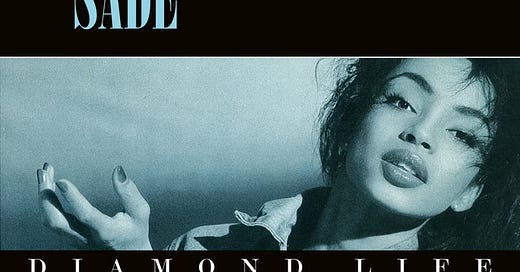The 1985 Project Part 14 - Sade - Diamond Life
I had forgotten how quickly Sade became a pop music force
Sometime in spring or summer of 1984, I read one of those British music newspapers, New Musical Express or Melody Maker or Sounds, about a pair of up and coming sure-to-be-superstars. Each were making music with similar approaches, a chanteuse over light, jazzy, sparse yet danceable backgrounds. One was named Carmel. I’m not sure I ever actually heard her music, though I do remember ordering an import copy of her album for the record store in which I worked. The other was Sade.
Sade Adu was an immediate sensation in England, with her debut single, “Your Love is King” flying up to number 6 on the charts. I say her, but really Sade, the name on the album, was and is a band. Save for the drummer chair, the men who played on this debut album have played on all the records and tours Sade has done these past 40 years.
My reaction to Sade once I heard them – which I assume wasn’t until early 1985 when the record was released in America – was to categorize them alongside the Style Council, Paul Weller’s jazzier, cooler combo after he left the Jam. By that time, I wasn’t really too interested in this sort of thing, though I couldn’t ignore the catchiness of Sade’s singles, most especially “Smooth Operator.” I definitely didn’t own the album in 1985, though the whole thing did sound familiar when I played it again this week. I must have heard it in the record store now and again.
I would come to appreciate Sade more and more over the years, culminating in the time I saw them live in 1992. While the band members are fine instrumentalists, Sade Adu is the compelling factor in this music. Her vocals are so smooth, so measured, so pitch perfect for the material at hand. And the material on this debut album, which managed to sell 10 million copies worldwide, is mostly pretty strong stuff.
No question the first three songs on the album are the best. “Smooth Operator” has hints of bossa nova lilt to it, but with a more forceful back beat. Sade sings of the excitement generated by a lover with no heart, of the ways he lets her “move in space with minimum waste and maximum joy.” She’s aware of what’s going on with this guy whose “eyes are like angels but his heart is cold.” But as long as she’s going into it with no other expectations, she’ll deal with a smooth operator for a while.
On the other hand, the partner in “Your Love Is King” seems to be the real thing, and the near Smokey Robinson-level quiet storm approach of the song is exhilarating. “Your kisses ring round and round and round my head / Touching the very part of me, it’s making my heart sing.” The groove smolders, Sade holds some notes for several beats and lets others dance quickly across measures. The sax solo may not be inventive, but it fits the mood. It’s easy to see why this song would be successful even when the public didn’t know the artist yet.
“Hang On To Your Love” hankers after a Michael Jackson slow tempo dance feel, and comes close enough to fill floors if a DJ puts it on. It’s sung as advice to somebody willing to walk away from love – “ Be brave when the journey is rough.” “You’ve got to hold on longer if you want your love to grow.” Sade’s vocal is strong and confident, but it’s the groove and the piano chords that sell this song. There are days when this is one of my very fave Sade numbers.
The album is less consistent from that point, though none of the songs fall below a highly listenable pleasant approach. “Cherry Pie” and “I Will Be Your Friend” are the best of the rest, with an interesting cover of Timmy Thomas’ “Why Can’t We Live Together” closing out the record. It’s weird because Thomas’ emphasized a more oddball feel thanks to an early use of rhythm machine in pop music. The Sade version is done with live drums, and this makes it sound like a more ordinary song. Until Adu sings it with an expressive power Thomas never knew.
As far as I know, Sade is still operating, smoothly or not, though they’ve only released two albums after 1992, the last one coming in 2010. This is where it all started, though, and it still sounds pretty good. I’ll give it an 8 out of 10 points.




I ran out and bought it in '85, captivated by the understated bossa nova sound. I later wrote that Smooth Operator's persistent minor key (Am) brought out ih her voice "the languid longing for more, in someone who's already had enough." Thanks for bringing it back to mind.